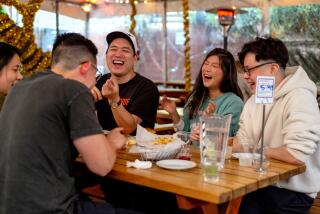Panda Express, on a Roll, Looks to Grow
Panda Express, a family-owned Chinese restaurant chain, is rolling the dice with its first-ever television ads as it expands in Las Vegas.
Aimed at young adults, commercials for the South Pasadena-based chain combine traditional Chinese symbols with wry humor. One spot says consumers cannot survive on tacos, pizza and hamburgers alone--an attempt by Panda to position itself as an alternative to standard fast-food fare.
“We’re still small potatoes,” said Andrew Cherng, chairman of Panda Express’ parent, Panda Management Co. “McDonald’s versus Panda--the scale is not relevant. But the opportunities are very good in terms of growing our business.”
The commercials come as Panda Express mounts an aggressive expansion. It plans to increase its number of restaurants to 400 next year from 320. Besides Las Vegas, Panda has targeted Northern California, Seattle, Phoenix and Washington for growth.
Panda Management, which also operates sit-down restaurants, anticipates sales for Panda Express will reach $200 million this year, up from $153 million in 1998. Panda Express accounts for 80% of the parent company’s total revenue.
The ads started airing July 26, and Panda President and Chief Executive Peggy Cherng said it is too soon to say how they are working, although some stores in Las Vegas have shown increased sales.
Each of the commercials begins with traditional Chinese music. One ad contrasts a “Stone Age” America of centuries ago with a China so developed even then that it had gourmet chefs. When a gong sounds, the ad fast-forwards to the present, showing Panda Express chefs chopping and cooking to a driving rock music tempo.
The commercials, shot at the Panda Express at 29th and Figueroa in Los Angeles, conclude with the tag line, “Far east of ordinary fast food.”
The Cherngs say the commercials emphasize what they consider to be Panda Express’ chief attribute: freshly made dishes with vegetables--fare not available at typical fast-food restaurants. The $200,000 ads were created by Los Angeles-based Golden Spike Resources Group.
Panda Express has come a long way since the first location opened in the Glendale Galleria in 1983. After establishing locations in other malls and later inside Pavilions supermarkets, it began opening free-standing restaurants.
Andrew Cherng said that the shift requires a change in marketing strategy. Malls and supermarkets help drive traffic to restaurants located there. But commercials are needed to attract diners to the free-standing restaurants, he said.
Panda plans to get the most from its investment in the TV spots. If successful in Las Vegas, plans are to air them in San Diego. The $40,000 Las Vegas TV campaign ends Sept. 3.
Analysts say Panda Express is the largest fast-food chain specializing in Chinese food. But it faces increasing competition. Other expansion-minded companies are staking claims to consumers’ appetites.
Yoshinoya Beef Bowl Restaurants, a subsidiary of Torrance-based Yoshinoya West Inc., has 90 stores in California and is planning a major expansion. Pick Up Stix, based in San Clemente, has about 32 outlets, mainly in Los Angeles and Orange counties but with four in the Las Vegas area. And Toronto-based Manchu Wok has 188 locations spread through the 50 states and across Canada.
And with its sit-down establishments, Panda Express competes with traditional Chinese restaurants.
At the same time, Panda has several advantages, analysts say. It has a focused menu, a strategy that keeps things simple and helps control quality. It offers just 10 basic dishes, plus a few specials, including items developed by employees.
And, analysts say, the food passes muster. Panda’s recipes are adapted from the originals of Andrew Cherng’s father, the late Ming Tsai, a master chef in Taipei. In 1973, the father-son team opened the first of their seven Panda Inns in Pasadena.
“When a master chef creates a recipe, to the extent they’re able to maintain the integrity of the recipe in a quick-serve” context, that may give them an advantage over other Chinese quick-servers, said Richard Martin, an editor at Nation’s Restaurant News, a trade publication.
Panda is now run by an immigrant husband-wife team who gave up science for the kitchen. Andrew has a master’s degree in applied mathematics from the University of Missouri, where he met Peggy, who obtained a master’s degree in computer science and a doctorate in electrical engineering there.
“It may be the thinking man’s fast food,” Martin said.
More to Read
Eat your way across L.A.
Get our weekly Tasting Notes newsletter for reviews, news and more.
You may occasionally receive promotional content from the Los Angeles Times.






